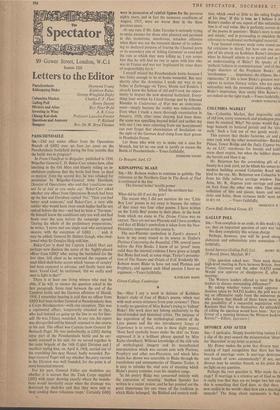Letters to the Editor
Passchendaele Desmond Young Kidnapping Blake Kathleen Raine, George Wingfield Digby 'Columbia Market Charles F. F. Fleet Gallup Poll Henry Durant Divorce and After Rev. Peter Wyld Investing in Wine A. R.'Cross Chiang Kai-shek Professor Lancelot Forster Questions and Answers P. Rickard Hungary Rev. Dr. W. Bryn Thomas PASSCHENDAELE Snt,—Did any senior officer from the Operations Branch of GHQ ever set foot .(or eyes) on the Passchendaele battlefield during the four months that the battle was in progress?
In From Chauffeur to Brigadier, published in 1930, Brigadier-General C. D. Baker-Carr• relates how, after lunching in the OA Mess and bluntly telling an in- credulous audience that the battle had been 'as dead as mutton' from the second day, he was rebuked for pessimism by Brigadier-General John Davidson, Director of Operations, who said that 'conditions can- not be as bad as you make out.' Baker-Carr asked whether any officer from Operations Branch had been up the line and Davidson replied `No.' Then you had better send someone,' said Baker-Carr, a very able soldier who would have risen much higher had he not retired before the war—and had he been a 'Yes-man.' He himself knew the conditions only too well and had flown over the area before the campaign opened.
'During the whole of the preliminary preparations,' he writes, 'I never met one single soul who anticipated success, with the exception of GHQ . . .' and, it may be added, General Sir Hubert Gough, who swal- lowed what Sir Douglas Haig told him.
Baker-Carr is dead but Captain Liddell Hart can perhaps now disclose the name of the 'highly-placed officer from GHQ' who, seeing the battlefield for the first time, fell silent as he surveyed the expanse of mud-filled shell-holes across which 'masses of cavalry' had been expected to advance, and finally burst into tears. 'Good God,' he exclaimed, 'did we really send men to fight in that?'
There is at least one living witness who may be able, if he will, to answer the question asked in the first paragraph. Some time between the end of the Cambrai battle and the German offensive of March, 1918, I remember hearing it said that no officer from GHQ had been farther forward at Passchendaele than a Corps Headquarters—with one exception. This was a regimental officer, temporarily attached to Ops., who had insisted on going up the line to see for him- self. He was, I fancy, wounded. At any rate, his report was disregarded and he himself returned in due course to his unit. The officer was Captain (now General Sir Bernard) Paget. He was undoubtedly at GHQ during some part of the Passchendaele battle and he cer- tainly returned• to his unit, for we served together in the same brigade of the 14th (Light) Division and I recollect seeing him, on April 4, 1918, carried out of the crumbling line near Hamel, badly wounded. Per- haps General Paget will say whether the,story current in the Division was well founded, for the point is of some historical interest.
For his part, General Fuller can doubtless say whether it is correct that the Tank Corps supplied GHQ with maps showing exactly where the inunda- tions would inevitably occur when the drainage was destroyed by shell-fire and that they were told to 'stop sending these ridiculous maps.' Certainly GHQ were in possession of rainfall figures for the previous eighty years, and in fact the monsoon conditions of August, 1917, were no worse than in the three previous years.
,At any rate, if Mr. John Terraine is seriously trying to make excuses for those who planned and persisted in this monstrous, murderous, senseless offensive when there was not the remotest chance of its achiev- ing its declared purpose of freeing the Channel ports or its secondary aim of 'killing Germans' at even half the rate at which they were killing us, I can assure him that he will find no one to agree with him who was in France and was not 'implicated by some share • of responsibility for it.'
I myself missed the Passchendaele battle because I was lucky enough to be at home wounded. But very shortly after the Armistice I made my way to my father at Zeebrugge via Ypres, Mcnin and Roulers. I already knew the Salient of old and I took the oppor- tunity to inspect the now deserted battlefield. Every- thing later written by Lloyd George and by Edmund Blunden in Undertones of War was an understate- ment—simply because the reality was indescribable. Even when I made a more thorough examination in January, 1920, after some clearing had been done, the scene was appalling beyond belief and neither my wife nor I (we were returning from our honeymoon) can ever forget that abomination of desolation—or the sight of the German dead rising from their graves in Houthulst Forest.
Let those who wish try to make out 15 case for Munich, but let no one seek to justify or excuse the Battle of Passchendaele.—Yours faithfully,


























 Previous page
Previous page